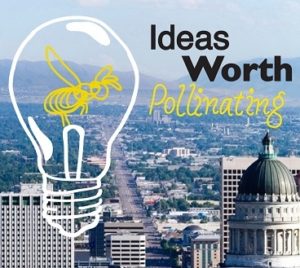In this three-part series, we talk with Anna Decker, organizer of the TEDx program at the Leonardo (and additional simulcast sites) September 20.
Decker, 31, is a University of Utah graduate student with experience in event planning. She wanted to use the TED platform “for a local conversation that was interdisciplinary and acceptable to the entire community… I plan on doing it annually and indefinitely.”
Part III: Open-mindedness versus Liberalism
UO: I was talking with David Sturt (one of the TEDx speakers) about the idea of open-mindedness. Some equate open-mindedness with liberalism. Yet after talking with Dave, I realized there’re just as many closed-minded liberals as there are closed-minded conservatives.
Do you equate open mindedness with liberalism?
AD: I don’t. I think open-mindedness is independent from your political beliefs. We have the entire spectrum represented on our committee. We have staunch libertarians to staunch liberals and everything in between.
It’s really fascinating because amidst all that is this amazing coherence within the group. Despite our varying political beliefs, we are all open-minded.
Everyone on the team is willing to consider other perspectives and we’re willing to consider new approaches, new containers for interactions. I think you can be anywhere on the political spectrum and pause.
I think that’s what open-mindedness is: just being able to pause and say ‘what would it be like if I got up, went over and sat in that chair?’ That willingness comes from a level of personal maturity, integrity, and willingness to trust. That can be anyone from any political affiliation.
UO: Have you run into any resistance in Utah, which is heavily conservative and heavily Mormon? As we know, obedience is one of the tenants of the Mormon faith. Could that run counter to TED’s arena of open-mindedness?
AD: Great question. I think it’s a complex issue, especially in the state of Utah where we do have some significant influences that create a general body, a majority way of thinking. But I don’t think these things are static. I think they’re dynamic and ever-changing.
You can look at it from an evolutionary perspective or you can look at it from a developmental psychology perspective:
Parts of our brain are built to protect us, constantly scanning the environment to ask ‘Are there threats?’ ‘Am I in danger?’ ‘Am I safe?’ Those traits are very much still in tact, even from 10,000 years ago.
Researchers are showing that we’re starting to let go or let those parts of our brain not be so active all the time. We can engage a different part of our brain that allows us not only to connect with others, but to see the benefit of connecting with and collaborating with others who may seem different than us.
We see it not only in Salt Lake City, but in a number of books by researchers at Harvard and MIT, we’re seeing this phenomenon around the world: using the gift of technology to recognize other people who maybe have a different culture or have a different marriage construct. We see that we actually have a lot in common.
Our approach is that we really do not see religion or age or gender or ethnicity. Those just are not factors in our conversation. When we’re looking at speakers or looking at talks, we simply are just not looking left or right, white, black, or any of those things.
Because of that, we haven’t seen a lot of resistance. We haven’t seen a lot of things come up because we’re not speaking to the differences, to the “How is this different?” or “How is this better?”
But rather, we’re coming at it from a place of: This is something that’s important to all of us, something that can be useful to everyone:
- Who doesn’t care about their health?
- Who doesn’t care about education?
- Or how they get from point A to point B in their day?
Those are parts of our world that we’re all engaged with. It’s been our job to approach these topics from a very neutral place.
UO: There are 10 men and just 2 women speaking this year.
AD: Yes, there’s been some scrutiny there. That’s valid…We’d love to see more women speakers on our stage. Less than 10 or 15 percent of the submissions were from women. So, we had a representative number from the entire population of applicants.
So, we will be asking the community:
Tell us what you think.
How can we get more women on our stage?
In a balanced, non-biased, mature way, how can we invite more women to have this opportunity?
We welcome those conversations because at the end of the day, it means that they’re thinking, they care, they want change, and we embrace that 100 percent.
UO: What would your strategy be to accomplish that?
AD: To reach out to those who are passionate about those things and say, ‘We’d like you to know that we’re hosting this event and anyone is welcome…”
Our focus is ‘Ideas Worth Spreading.’ Let’s cast our net wide. Let’s identify all these organizations interested in making sure more voices from this demographic or that demographic are heard. They can do that. We work with them.
But we don’t want to create any sort of artificial bias. For example, I’m a woman. I don’t want to get special treatment for being a woman and I don’t want to get subpar treatment for being a woman. Either way.
I want it to be who I am as an individual…My ideas are what I value most. I want people to look at me and hear my ideas and not have them skewed one way or another by any of those demographic things that I really didn’t have control over.
Not everyone thinks the growth of TEDx events has been a good thing. Read more about that here.


